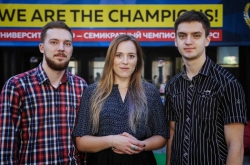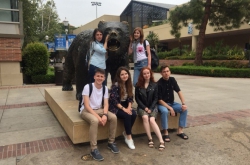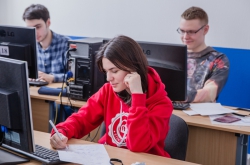On the project
MSCA-RISE «MinD» is a Research and Innovation Staff Exchange (RISE) project aimed at the development of interdisciplinary approaches to psychological and social counselling of people with dementia that is conducted as part of the Horizon 2020 program.
People suffering from Alzheimer’s and dementia often face cognitive, behavioral, psychological and social problems, which acts as a major hindrance to social activity and personal well-being. Participants of MSCA-RISE «MinD» aim to develop new approaches that can help such people. They plan to come up with a reliable methodological structure for development and assessment of associated projects, as well as a comprehensive model that can contribute to integrating people with dementia into our society.
The project is being conducted by an interdisciplinary consortium that involves academic and industrial partners: researchers in the field of psychology and medicine, as well as companies focusing on ICT, product and environment design. MSCA-RISE «MinD» is being supervised by the University of Wolverhampton (Great Britain); among the partners are the University of Luxembourg, the University of Twente (the Netherlands), Dresden University of Technology (Germany), the University of Queensland (Australia), as well as St. Hedwig hospital, such companies as Eurecat, Picharchitects, and others. The completion of the project is planned for 2020.

Among the project's participants is ITMO PhD student Daniil Razdyakonov, who studies on the Mathematical and Software Support of Computer Systems and Networks program. As part of the project, the student worked with scientists and programmers who develop mobile apps for people with dementia, did internships in Great Britain and Germany, and became part of an interdisciplinary research team.
Software for people with dementia
Daniil’s first internship took place in May at the University of Wolverhampton, and the second ended in Germany in the end of June. Each took two weeks, during which Daniil was working on two projects.
“The initial idea was to develop an application that would help people with dementia to adapt to living in society. MSCA-RISE «MinD» enveloped several subprojects. The first one, PPI (Patient and Public Involvement), focused on encouraging patients' friends and relatives to be around and support them. In a sense, this is something similar to social networks. For instance, one could set the “ready to communicate” status. When a demented person logs in, they see the number of people who are ready to talk to them, and can send them a message,” explains Daniil Razdyakonov.
The goal of the second project, GLK (Good-life kit), was to help create a particular “map of life”. With the help of this program, a person who is gradually forgetting more and more facts can store memories by associating photographs with particular places and adding the necessary notes. The main idea was to create a program which resembles a board game, executed as a physical format with cards, and a digital version. When working on these two projects, Daniil was both an IT specialist and a designer: his tasks included not only programming but also development and design of interfaces.
“By the time I arrived, they already had design layouts for the first project, while the second project existed as an idea only. We were split in teams, and I first worked on the “map of life” project. I have to say that at first, it was less about programming and more about developing everything from scratch, being a designer. This was very interesting. Designers tend to propose numerous ideas that programmers often find impossible to work with. I got to take a look at the other aspect of development and expand my outlook: to first come up with an idea and only then think about bringing it to life,” shares the PhD student.
Developing the interface took about ten days; during the same time, the proposed solutions were tested on focus groups. In the remaining time, Daniil got to work on the first project, as well. In the end, the developers created a mobile app that allowed to navigate pages.
The internship in Germany also consisted of two parts: during the first days, Daniil worked not far from Berlin, at Krankenhaus Hedwigshöhe, one of the departments of St. Hedwig hospital, where he continued to develop the GLK project with regard to new data from the participants of focus groups. The second part took place in Dresden and focused on developing the first project’s prototype.

“As of now, we’ve got all parts of our application ready: the login page, the page where one chooses an attendant, and the activity page. Upon logging in, the user can choose where they want to go and with whom, or choose any other particular kind of activity and its participants, explains Daniil. We intend for the application to perform the functions of social networks, but to also be geared towards people with dementia and their relatives. For now, we are working on the issue of where to take data from. It’s possible that we will be using social API of popular social networks, which would make it possible for the relatives to continue using common social networks while the demented will use our app that has a simpler and more comprehensible interface.”
Future prospects
By now, the team has all the graphical elements done. Still, what awaits them is serious work on combining front-end and back-end, solutions for database deployment, and they also have to decide on the final project’s format. What is more, they have plans for adding the opportunity to make conference calls.
In October 2018, Daniil will go to the University of Wolverhampton to finish working on the project.
Apart from his participation in MSCA-RISE «MinD», Daniil Razdyakonov studies on a PhD program at ITMO and works for the VISmart company, a resident of ITMO University Technopark. The company focuses on developing software in the field of semantic web. According to the PhD student, the knowledge he got at the university and the company help him to apply his skills in major international projects.
“I work on different kinds of projects at VISmart, which is why I was ready for everything. For example, when I only started working for the company, we were working on an application which allowed to monitor cars in parking lots. This app was introduced at several enterprises, including Mercedez-Benz and others. At the same time, we were also working on data visualization projects for several companies and understood that there’s both a demand and scientific potential to them,” says Daniil.
For now, the company’s main focus is the Ontodia library for visualizing ontological and semantic data (you can read more about the project here). Daniil’s current research also has to do with developing a method for visual control of ontological data in three-dimensional virtual space.
The Ontodia library can visualize any data that has a logical structure. For instance, visualizing business data can help understand the interactions between company staff, its structure and the like, though this information can be easily represented as a graph. Why visualize such data in 3D? Despite all its advantages, representing data as graphs has its deficiencies. For one, comparing two massive graphs represented in 2D can be quite hard, while in three-dimensional space one can place the graphs one after the next, thus making the process easier. On the initial stage of his work, the PhD student proposes a three-dimensional visualization method for displays, and then plans to develop a system that makes use of VR technology.





